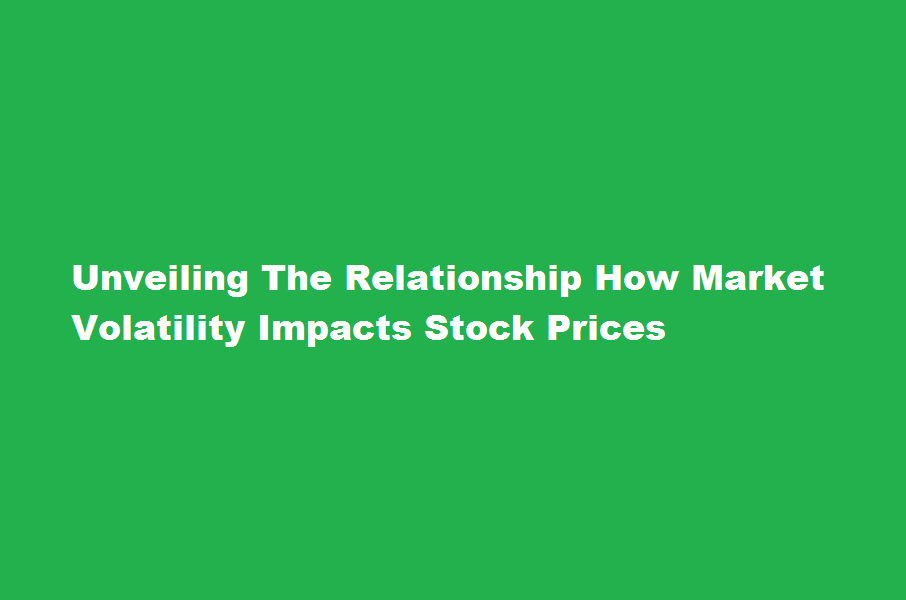Unveiling The Relationship How Market Volatility Impacts Stock Prices
4 min read
Introduction
Market volatility is a common occurrence in the world of investing, characterized by fluctuations and rapid changes in stock prices. Understanding how market volatility impacts stock prices is crucial for investors seeking to make informed decisions and manage their portfolios effectively. This article aims to shed light on the relationship between market volatility and stock prices, exploring the factors influencing this dynamic and offering insights for navigating volatile market conditions.
Defining Market Volatility
Market volatility refers to the magnitude and frequency of price fluctuations in the financial markets. It is often measured by indicators such as the VIX (Volatility Index) or historical price volatility. High market volatility signifies greater uncertainty and potential price swings, while low volatility indicates relative stability.
Relationship between Market Volatility and Stock Prices
Negative Impact – Increased market volatility generally has a negative impact on stock prices. Heightened uncertainty and fear among investors can lead to selling pressure, driving prices lower. Investors may become more risk-averse and seek safer assets during volatile periods, impacting stock prices across the board.
Positive Impact – In some cases, market volatility can have a positive impact on stock prices. For example, if there is positive news or a significant event that increases market activity and investor confidence, stock prices may experience a temporary surge.
Factors Influencing the Impact of Market Volatility
- Investor Sentiment – Investor sentiment plays a crucial role in determining the impact of market volatility on stock prices. Fear and panic-driven selling can intensify price declines, while optimism and buying activity can mitigate the negative impact and potentially lead to price recoveries.
- Economic Conditions – Market volatility is often influenced by economic conditions such as GDP growth, inflation, interest rates, and geopolitical events. Economic downturns or unexpected shocks can amplify market volatility and contribute to significant fluctuations in stock prices.
- Company-Specific Factors – Company-specific factors, such as earnings reports, management changes, or product launches, can influence how individual stocks react to market volatility. Strong fundamentals and positive news may help buffer the negative impact of market volatility on specific stocks.
- Diversification – Diversifying your investment portfolio across different asset classes, sectors, and geographical regions can help mitigate the impact of market volatility. By spreading risk, investors can reduce the potential negative impact of volatility on their overall portfolio.
- Long-Term Perspective – Taking a long-term perspective can help investors weather short-term market volatility. Focusing on the underlying fundamentals of the companies in which you invest and their long-term growth potential can help maintain confidence during turbulent periods.
- Risk Management – Implementing risk management strategies, such as setting stop-loss orders or employing hedging techniques, can help limit potential losses during volatile market conditions. These strategies allow investors to protect their portfolios while still participating in market opportunities.
Frequently Asked Questions
How does market volatility impact short-term traders versus long-term investors?
Market volatility can create both opportunities and risks for short-term traders. Volatile markets offer the potential for higher returns but also increase the likelihood of larger losses. Long-term investors, on the other hand, can leverage volatility by focusing on the fundamentals and staying committed to their investment strategies.
Can market volatility be predicted or timed?
Predicting or timing market volatility consistently is challenging, if not impossible. Market volatility can be influenced by numerous factors, many of which are unpredictable. Instead of trying to time volatility, it is advisable to focus on managing risk and maintaining a diversified portfolio.
Are there sectors or industries that are more susceptible to market volatility?
Certain sectors, such as technology or biotechnology, tend to be more volatile due to their dependence on innovation, market trends, and regulatory factors. Additionally, industries tied to commodities or cyclical economic conditions may experience heightened volatility. However, market volatility can impact all sectors to some extent.
Conclusion
Market volatility has a significant impact on stock prices, driven by investor sentiment, economic conditions, and company-specific factors. Understanding the relationship between market volatility and stock prices empowers investors to make informed decisions and navigate volatile market conditions effectively. By diversifying portfolios, maintaining a long-term perspective, and implementing risk management strategies, investors can mitigate the negative impact of market volatility and potentially capitalize on opportunities that arise.
Read Also : Demystifying Dividends How Do Dividends Work for Stocks






